Maternal Health Equity Report
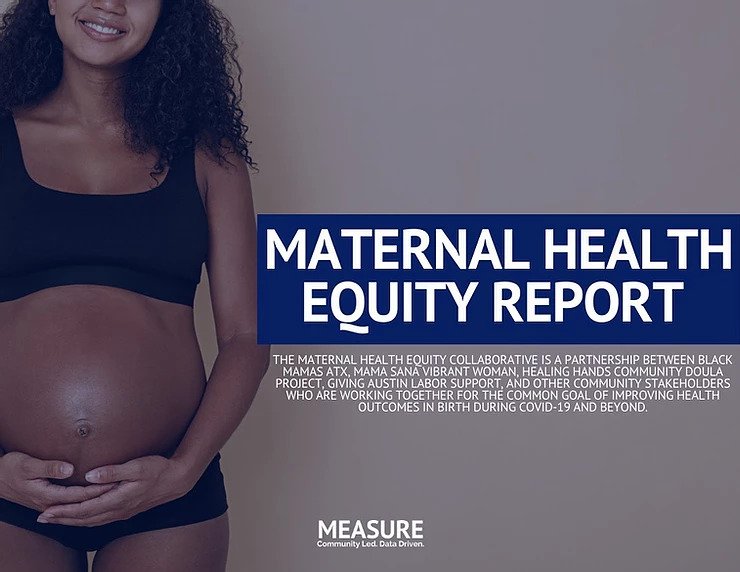
MEASURE and the Maternal Health Equity Collaborative developed a survey to assess the unique needs of pregnant people during COVID-19, specifically Black women and Black, Indigenous, and people of color (BIPOC) families. This survey helped to gather lived-experience data from BIPOC mothers’ lived experiences in Central Texas. MEASURE_ Maternal Health Equity Report 2020.pdf
Our Black Girls Need Us
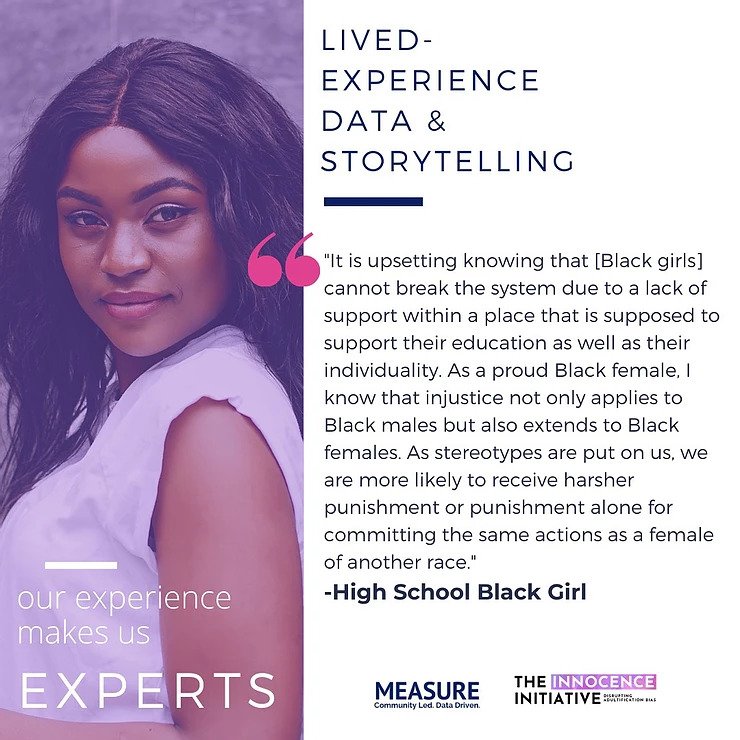
Download the Black Paper Below MEASURE_ The Innocence Initiative 2020 School & Local Policy Brief.pdf
Volunteer Spotlight
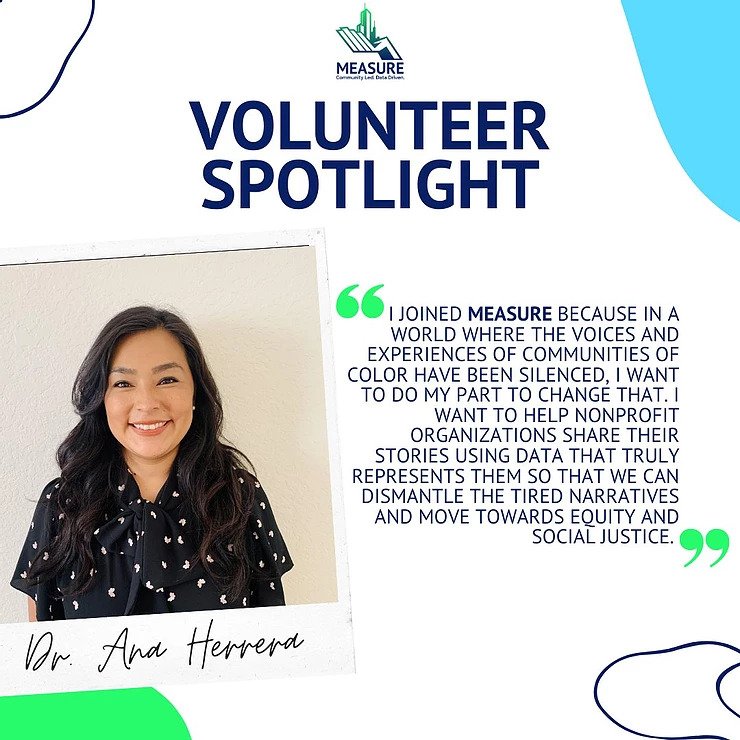
Our September MEASURE Volunteer Spotlight is Dr. Ana Herrera! Dr. Ana Herrera is a member of the MEASURE Research Division. She serves as Director of Organizational Support & Evaluation. She is leading the Travis County Girl Squad Evaluation project and is also providing survey design support in our mission as an organization to provide data support to Black and Brown-led nonprofits. Ana is a bright spirit who shows up ready to serve! Thank you for all that you do! https://media4.giphy.com/media/3o6ozuHcxTtVWJJn32/giphy.mp4
MEASURE Spotlight
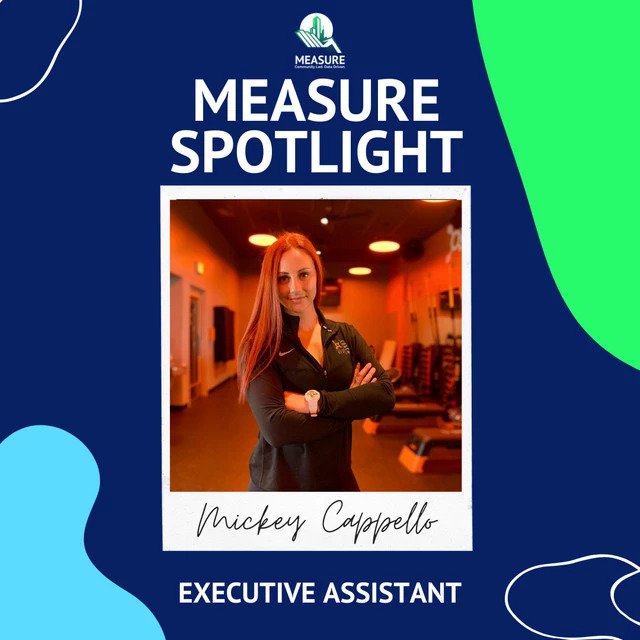
Our September MEASURE Spotlight is Mickey Cappello! Follow Mickey on IG: https://www.instagram.com/micklespickles96/. Let’s get to know her! Why did you join MEASURE? “I heard Meme speak in an interview regarding the important of data in social justice and the need for education to facilitate change. I was already planning on leaving my current job at the time, was so moved by what she stood for and the work that MEASURE does, I put in my two weeks notice, reached out to her and her team, and here I am helping transform peoples’ lives every single day.” What is your role with MEASURE? “I am MEASURE’s Executive Assistant, primarily supporting our Founder and Vice President. My role has multiple parts to it, from answering general inquiries from the public to organizing our main calendar, managing Meme and Precious’ calendars, assisting volunteers through projects, and leading CARE Teams as a CME through a community survey-tool project. I get to do just about everything!” What is your favorite food? “Salmon any type of way!” What is your Dream destination? “Greece!”
Bring Your Megaphone. Hurry.
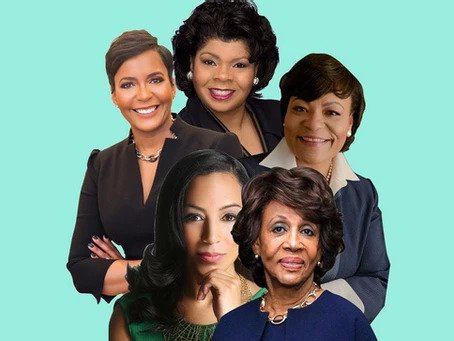
By Kendra Bolton “Can you hear them?” she asked. “Sorta. It’s muffled,” her friend answered. “Can you see them?” “Hardly. If I look around that guy, kinda.” This conversation could be friends chatting in the very last row of a concert venue. It’s not. Replace ‘them’ with ‘Black women in politics.’ Now, read that again. Same answers apply. A Black woman vice president candidate proves how far we’ve come and confirms that Black woman political power is ripe for the taking. But, a close look at the numbers shows evidence that we need to create these opportunities now. Black women are underrepresented. Period. Shellie Hayes-McMahon, a Black woman and resident of Cedar Park, Texas realized she was legislating everyday like so many women do with family, work, children and more. She had talent to share with her community so she ran for city council. Hayes-McMahon knew campaigning would require grit, of which she has plenty, she did not know it would require drawing the curtains to protect her life. https://media3.giphy.com/media/S8xjqtikfdBuSf0Dk6/giphy.mp4?cid=e2a3cbde4tflamq4cuqx6lfsu0ryb2712la9jlu7w8fx9k34&rid=giphy.mp4 We learned Hayes-McMahon’s story in our virtual sit-down with her and Royce Brooks, respectively Operations Director and Executive Director of Annie’s List. The Status of Black Women in the United States 2017, published by the Institute for Women’s Policy Research reports that political representation is highly significant in determining which issues, policies, and communities’ needs get prioritized. It further details several studies that find Black women legislate in different ways from other groups of women and Black men due to their particular locations at the intersections of race and gender. Hayes-McMahon has this lived experience and built the courage to share it. She says, “We have so much at stake we can’t afford to sit out. Our lived experiences and voices are important.” There is so much at stake and so much to overcome to secure political office. Brooks concisely describes the system as designed to be responsive to money.” Research from the Center for Responsive Politics cites that Black women are the least resourced demographic group and we see this play out at all levels. It states, “In 2014, Black women composed 6.4 percent of the United States population, but as of August 2016 held only 3.4 percent of seats in the United States Congress and no seats in the U.S. Senate.” (IWPR.ORG The Status of Black Women in the United States. 2017). There are no Black women in the Texas State Senate, Black women make up only 6 percent of the Texas House of Representatives and there are no Black women mayors of Texas’ large cities. Walking us through her campaign journey, Hayes-McMahon offered some reflections. “You have to ask, how much are you willing to minimize yourself?”… “People don’t take us seriously, we are not sought out in suburban communities.” When running for office Hayes-McMahon received death threats because she is Black. To keep herself and her family safe they drew their window curtains and were forced to stay in their house for 48 hours. In Cedar Park. In 2018. Hayes-McMahon continued her campaign but lost by a small margin. “Brooks says, Black women speaking from a position of power or authority are automatically at odds with the structure on which society is built.” There are loud, redundant voices that get to use the exclusive systems and platforms of our political process and this must change. We must make, protect and hold space for Black women. Our communities are weeping. Our hearts are heavy. Show up. Bring your megaphone. Hold it for the voices of Black women. Hurry. Visit annieslist.com to learn how you can support Black women candidates. If you’re not registered to vote in Texas, visit votetexas.gov. If you’re out-of-state, visit usa.gov/election-office. If you’re voting by mail or absentee, make sure you are qualified and do it early. Visit our data gallery on our website for more information on a variety of social justice topics like education and health. Sources: Ura, Alexa & Cameron, Darla. “In increasingly diverse Texas, the Legislature remains mostly white and male”. Texas Tribune. January 10, 2019. IWPR.ORG. The Status of Black Women in the United States. 2017.
MEASURE releases comic book aimed at educating parents and schools on criminalization of Black girls
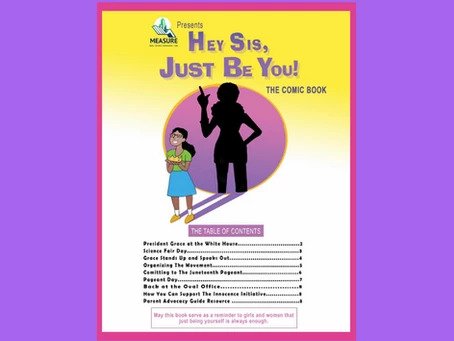
Media Contact: Brittini Flatley [email protected] MEASURE’s Innocence Initiative seeks to eradicate adultification bias and resulting criminalization of young Black girls MEASURE, a non-profit organization that uses data and education to mobilize communities to eliminate social disparities, today announced the release of an original and important comic book, Hey Sis! Be You! The story was created as a part of the Innocence Initiative to raise awareness of the national problem of the adultification of Black girls and provide parents with resources to advocate for their daughters. The comic tells the story of Grace, a girl who becomes the first Black female president, and strives to embolden and empower Black girls to become the superstars they are. The adultification of Black girls is one of the most underreported issues in social justice. In all areas of life—school, work and beyond, Black girls are treated and viewed differently than peers of other races from as early as age five. The comic features both locally and nationally prominent Black women like Austin, TX District 1 Councilwoman Natasha Harper-Madison and Congresswoman Ayanna Pressley of Massachusetts. It was first released in the latest issue of Austin Women’s Magazine and will soon be available to the public. It is illustrated by Austin’s Lakeem Wilson. The societal stereotypes of Black people are applied to Black children and particularly Black girls, and the data is troubling: As early as age five, Black girls are viewed by adults as more knowledgeable about sex and adult topics, less in need of nurture and support, and significantly older than white girls of the same age. Black girls are six times more likely to receive out of school suspensions than their white peers. Black girls are three times more likely than white girls to receive an office referral. Between 1996 and 2011, the number of Black female juvenile delinquency cases increased 18 percent while white girls’ share of cases decreased seven percent. “Adultification bias is real, and has been going on for hundreds of years,” said Meme Styles, Founder and President of MEASURE. “The data shows this is still prevalent today. We have not made progress on this front. With The Innocence Initiative we are working tirelessly to disrupt and dismantle this injustice through a variety of approaches. We hope Hey Sis! Be You! elevates the problem to schools and educators, equips parents with a new set of resources, and most of all, inspires young girls to unleash the powerful potential that lies just beneath their skin.” The Innocence Initiative was inspired by the Georgetown Law Center on Poverty and Inequality 2017 report, Girlhood Interrupted: The Erasure of Black Girls’ Childhood, a data-driven exposure of the prevalent problem of adultification of Black girls. Rep. Ayanna Pressley (D-MA) has also introduced a bill titled “The Ending Punitive, Unfair, School-Based Harm that is Overt and Unresponsive to Trauma” (PUSHOUT) Act, to put an end to the criminalization of Black children. The bill has been co-sponsored by Rep. Ilhan Omar (D-Minn). The Initiative seeks to educate and empower parents, educators, school systems, and other concerned citizens on the issue through data, real-life stories, training, advocacy, and more. “Ultimately, we believe that we are at a time, finally, where people in positions of influence are understanding all of the ways systemic racism affects the Black community beginning at a very early age,” says Styles. About The Innocence Initiative The Innocence Initiative is a collaboration that will elevate the data, listen to the real-life stories of Black girls, and address disparities that perpetuate adultification through advocacy, training, and a public awareness campaign. In order to eliminate adultification bias and change the narratives dictating how our children are viewed and treated, our community is driving 6 courses of action. In November 2019, Impact Austin awarded The Innocence Initiative a $110,000 grant to advance equity for women and girls of color in Central Texas. To learn more, please visit https://www.measureaustin.org/the-innocence-initiative. About MEASURE MEASURE seeks a better quality of life for members of underrepresented communities – especially People of Color through shared research, best practices, and community participatory action. MEASURE empowers underserved communities to become active participants in the process of changing statistics. To learn more please visit wemeasure.org.
Public Safety Vision 2020: Evidence-Informed Solutions

This report presents the data and trends in spending on police and some of the outcomes that have resulted. In addition, this report presents findings of non-police interventions and explores ideas for public safety improvements. The solutions provided in this report are not an exhaustive list and only serves as a starting point for developing a plan for shaping public safety of the future. Read The Report Finalized PDF.pdf MEASURE Public Safety Vision Report 2020 (Updated).pdf
Webinar – LBJ In The Arena: July 29: Rethinking Policing: Police Accreditation & Data Driven Policy

Join UT Austin’s, The LBJ School of Public Affairs , for their biweekly virtual session this Wednesday, July 29th, at 12pm CST via Zoom, that focuses on topics including systemic racism, policing reform and fair elections. “Longstanding tensions between Black and Brown communities and the police have come to a head with the killing of George Floyd. Global protests in support of the dignity of Black lives has followed suit as have calls to reform, defund and abolish the police. This historic moment represents an important time to rethink policing. LBJ Assistant Professor Gordon Abner will discuss his research on police accreditation and will talk with Jameila Meme Styles (Taliaferro) of MEASURE , an organization at the forefront of addressing community policing and social disparities through a data-driven model. Abner and Styles will talk about how to best harness data to bring about effective and equitable policies that reimagine policing.” Register Now: https://utexas.zoom.us/webinar/register/WN_ZMHLTNOtQZmGXeym2MkgxA
Disrupting Adultification Bias To Protect Black Girls

Let’s explore adultification bias, intersections and the impact in a public awareness webinar on July 29th at 6:30pm. Join us for a webinar training led by Jacqueline Miller as we explore the different methods of adultification bias, intersections and it’s impact. You’ll acquire knowledge on how to apply practical lessons learned in your place of work as well as at home as we fight against the unfair treatment of Black girls. Three dominant paradigms of Black femininity that originated in the South during the period of slavery have persisted into present-day culture, which “paint Black females as hypersexual, boisterous, aggressive, and unscrupulous”: • Sapphire (e.g., emasculating, loud, aggressive, angry, stubborn, and unfeminine); • Jezebel (e.g., hypersexualized, seductive and exploiter of men’s weaknesses); and • Mammy (e.g., self-sacrificing, nurturing, loving, asexual). These images and historical stereotypes of Black women have real-life consequences for Black girls today. For example, “teachers may subconsciously use stereotypical images of Black females … to interpret Black girls’ behaviors and respond more harshly to Black girls who display behaviors that do not align with traditional standards of femininity in which girls are expected to be docile, diffident, and selfless.” Such “tainted perceptions … result in patterns of discipline intended to reform the femininity of Black girls into something more ‘acceptable. MEASURE will continue our work to eliminate adultification bias by unpacking the “sapphire” stereotype in which still results in the unfair treatment of Black girls. Presented by Jacqueline Miller, Founder of Healthy Actions Intervening Responsibly. https://www.eventbrite.com/e/disrupting-adultification-bias-to-protect-black-girls-tickets-112731099754
International Best Selling Author & MEASURE Founder Sit Down For A Candid Discussion On Policing
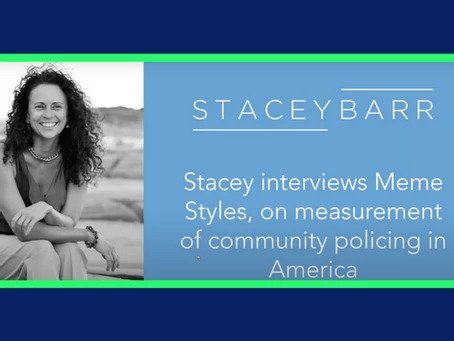
MEASURE founder, Meme Styles Taliaferro, sat down with international best selling author, Stacey Barr, author of Practical Performance Measurement and How to Create a High-Performance Culture and Measurable Success Prove It! for a open discussion on the measurement of community policing in America. Meme says, the “innovativeness (of MEASURE) comes from a performance measurement approach that focuses on using dialogue to create exceptionally high ownership of measures by people on both sides of the social issues.” “…In 2015 after having a very heated debate about the lack of community policing measures, I went to work to apply the PuMP methodology to that exact issue. We convened a Measure Design team that consisted of an equal number of community activists and an equal number of police officers in one room.” It is through these guided conversations, Meme and MEASURE, are able to understand and resolve community social issues. Learn more about MEASURE and Meme and ways to get involved, listen to the full interview below.


